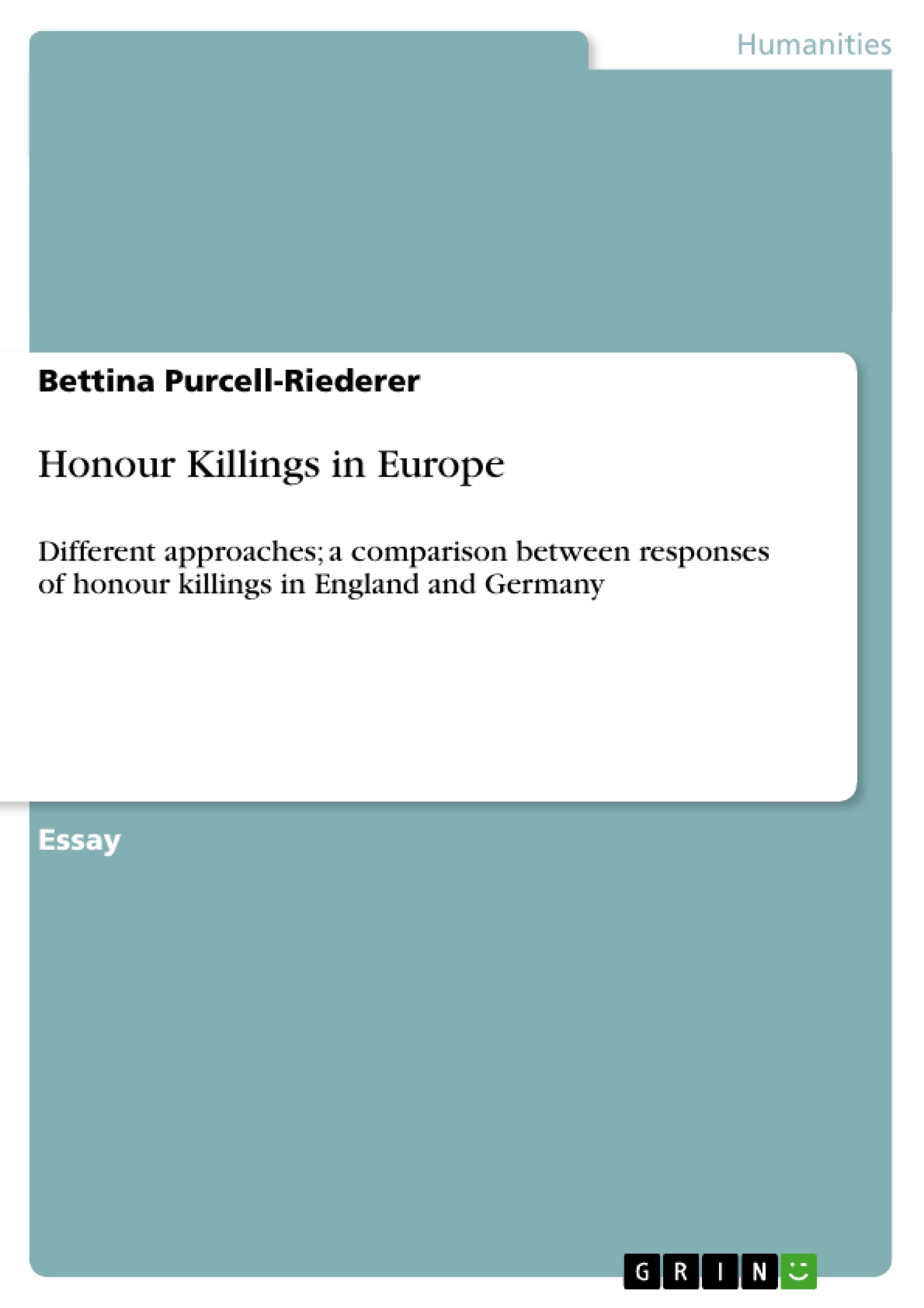In industrialised countries such as Germany and England the number of honour killings committed have increased (Schirrmacher, 2009). Cases in both countries have experienced large media attention and have been closely reported. The media in western countries tends to magnify differences especially from and to the Islamic world (Nelken 2010). Honour crimes and killings do not only occur in Eastern and Arab countries such as Pakistan Turkey or Iran etc., through globalisation and the increase of migration, honour killings have become an increasing problem in western countries as well (Schirrmacher, 2009). Continuing improvements of various means of transport and mobility has acquired a new dimension in the world of modernity (Garland, 2001). Globalisation is as Held (1999) writes, the widening deepening and speeding up of worldwide interconnections in all aspects of contemporary life. Honour killings are closely linked to globalisation and migration issues.
The most striking similarity between England and Germany is the total number of committed honour killings in the past few years. One can also find high resemblances in the convictions and sentences of perpetrator of honour killings. Despite these similarities the focus is to examine the cultural, social political and historical context of these high profile crimes in both countries.
The United Nation has published a response to crimes in the name of honour against women. In their last resolution from 2004 the UN expressed deep concerns that women and girls continue to be victims of honour based crimes. They remind states to exercise, to prevent, investigate and punish the perpetrators of such crimes committed against women and girls (UN, 2004). This comparative case study will focus on the state responses, which are required by the UN.
Therefore the examination will lay out the differences and similarities of state responses through legislations and police task forces and other law enforcements, how honour killings are recognised by the state in these two European countries. This examination will explore these responses within the cultural political social and historical context. In this project the focus is on honour killings, the extremist form of honour based violence and will undertake a comparison on how these two European countries respond to this violation of human rights in a broader context.
Inhaltsverzeichnis (Table of Contents)
- Introduction and Justification
- Methodology
- Limitations
- Germany
- Important historical developments
- England
- Important historical developments
Zielsetzung und Themenschwerpunkte (Objectives and Key Themes)
This case study compares the response to honour killings in England and Germany, examining the cultural, social, political, and historical contexts of these crimes. The main objective is to analyze the state’s response to honour killings in both countries by focusing on the legislation, police task forces, and other law enforcement measures, as well as the way honour killings are recognized by the state. This study will explore the cultural, political, social, and historical context within which these responses are situated, focusing on the differences and similarities between the two European countries.
- Comparison of state responses to honour killings in England and Germany.
- Analysis of the cultural, social, political, and historical contexts of honour killings in both countries.
- The role of globalisation and migration in the rise of honour killings in western societies.
- The impact of historical events such as colonialism and World War II on the cultural and social landscape of both countries.
- The challenges of cultural and social integration in multi-cultural societies.
Zusammenfassung der Kapitel (Chapter Summaries)
The introduction lays out the rationale for comparing state responses to honour killings in England and Germany, highlighting the increasing prevalence of these crimes in industrialized nations and the media attention they receive. The study emphasizes the need to understand honour killings within the context of globalization and migration.
The methodology section clarifies the comparative approach used in the study, focusing on identifying similarities and differences in responses to honour killings across both countries. The importance of cultural context in shaping criminal justice systems is highlighted, along with the need for a holistic perspective that considers cultural, economic, political, historical, and social factors.
The limitations section acknowledges inherent problems in comparative research, such as the difficulties in comparing statistical data and the challenge of interpreting concepts across different cultures. Language barriers and the differences in crime definitions and indicators are also discussed.
The chapter on Germany provides a brief historical and political overview, emphasizing the impact of World War II and the subsequent influx of Turkish immigrants on the country's cultural and social landscape. The emergence of parallel societies and the challenges of integration are explored, highlighting the potential for clashes between cultural and legal norms.
The chapter on England similarly outlines the historical and political context, focusing on the legacy of colonialism and the subsequent waves of immigration from former empire states. The study examines the impact of these migrations on the cultural and social landscape of England, emphasizing the challenges of integration and the potential for cultural conflict.
The concluding section compares the immigration developments in both countries, highlighting the commonalities and differences in their responses to migration and the emergence of cultural diversity. The study explores the dynamics of globalization and its role in shaping the cultural and social landscape of both countries.
Schlüsselwörter (Keywords)
This study focuses on the key topics of honour killings, comparative criminal justice, migration, globalization, cultural integration, parallel societies, and state responses to crime. It investigates the cultural, social, political, and historical contexts surrounding these themes in England and Germany.
- Quote paper
- Bettina Purcell-Riederer (Author), 2013, Honour Killings in Europe, Munich, GRIN Verlag, https://www.grin.com/document/230382




